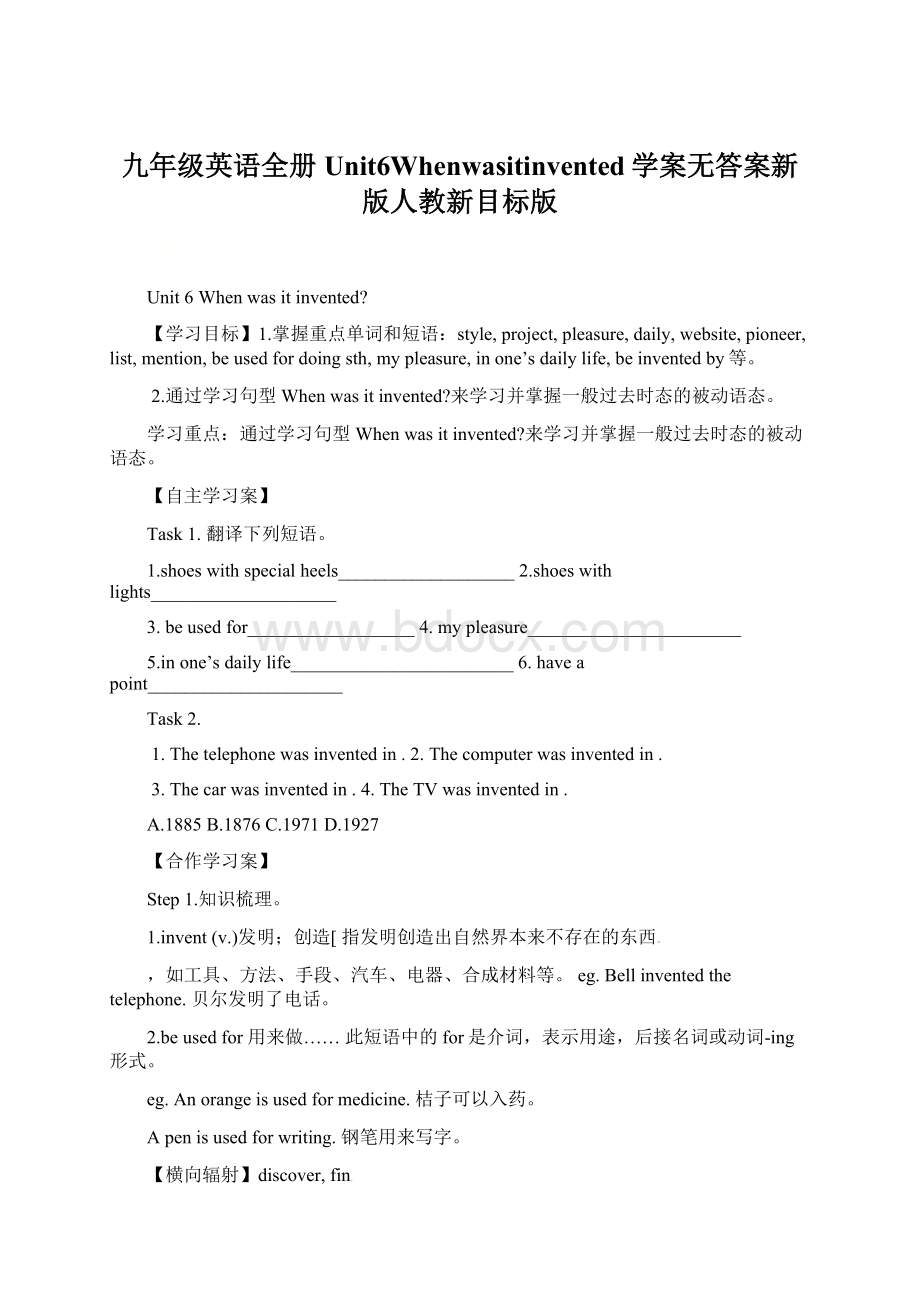九年级英语全册Unit6Whenwasitinvented学案无答案新版人教新目标版.docx
《九年级英语全册Unit6Whenwasitinvented学案无答案新版人教新目标版.docx》由会员分享,可在线阅读,更多相关《九年级英语全册Unit6Whenwasitinvented学案无答案新版人教新目标版.docx(11页珍藏版)》请在冰豆网上搜索。

九年级英语全册Unit6Whenwasitinvented学案无答案新版人教新目标版
Unit6Whenwasitinvented?
【学习目标】1.掌握重点单词和短语:
style,project,pleasure,daily,website,pioneer,list,mention,beusedfordoingsth,mypleasure,inone’sdailylife,beinventedby等。
2.通过学习句型Whenwasitinvented?
来学习并掌握一般过去时态的被动语态。
学习重点:
通过学习句型Whenwasitinvented?
来学习并掌握一般过去时态的被动语态。
【自主学习案】
Task1.翻译下列短语。
1.shoeswithspecialheels___________________2.shoeswithlights____________________
3.beusedfor__________________4.mypleasure_______________________
5.inone’sdailylife________________________6.haveapoint_____________________
Task2.
1.Thetelephonewasinventedin.2.Thecomputerwasinventedin.
3.Thecarwasinventedin.4.TheTVwasinventedin.
A.1885B.1876C.1971D.1927
【合作学习案】
Step1.知识梳理。
1.invent(v.)发明;创造[指发明创造出自然界本来不存在的东西
,如工具、方法、手段、汽车、电器、合成材料等。
eg.Bellinventedthetelephone.贝尔发明了电话。
2.beusedfor用来做……此短语中的for是介词,表示用途,后接名词或动词-ing形式。
eg.Anorangeisusedformedicine.桔子可以入药。
Apenisusedforwriting.钢笔用来写字。
【横向辐射】discover,fin
d,create
1.discover是“发现”的意思,是指发现原来就有而一直没被发现,如发现电、煤、石油等矿藏及新星、星系或科学真理等。
eg.ColumbusdiscoveredAmericain1492.1492年哥伦布发现了新大陆。
2.find的意思是“寻找”,强调找的结果,并不指发现。
eg.I'vetriedtofindanothercopybutcouldn'tfindone. 我试图再找一本,但没能弄到.
3.create指有目的地把原材料制成新产品,也指创造出原来不存在的或与众不同的事物。
eg.Mancreateshimself.人类创造了自己。
【横向辐射】beusedas&beusedby
1.beusedas意为“被用作……”,介词as表示“作为”,其后接名词,强调使用的工具及手段。
eg.Englishisusedasthesecondlanguageinmanycountries.
英语在许多国家被当作第二语言使用。
2.beusedby意为“被……使用”,介词by后面接动作的执行者(宾语)。
eg.Englishisusedbytravelersandbusinesspeopleallovertheworld.
全世界的旅行者和商人们使用英语。
【巩固训练案】
.按要求完成下列句子。
(1)Carswereinventedin1885.(对划线部分提问)carsinvented?
(2)JulieThompsoninventedelectricslippers.(改为被动语态)
ElectricslippersJulieThompson.
(3)Theshoeswithlightsareusedforseeinginthedark.(对划线部分提问)
aretheshoeswithlights?
(4)Thelightbulb(灯泡)wasinventedbyThomasEdison.(对划线部分提问)
thelightbulbinventedby?
(5)Therefrigeratorisusedtokeepfoodfresh.(改为同义句)
Therefrigeratorisusedfoodfresh.
.根据汉语意思完成句子。
(一空一词)
1.电脑是这样伟大的发明,以致极大地改变了世界。
Computerisagreatthatithaschangedtheworldalot.
2.想想电脑在我们日常生活中用得多么频繁。
Thinkabouthowthecomputerisourlives.
3.你可以列出你的工作项
目。
Youcanyourwork.
4.—你能帮我看看那鞋子
的款式吗?
—没问题。
—Canyouhelpmelookattheoftheshoes?
—.
5.没有提到那是被谁发明的。
Itdoesn’twhoit.
【学习目标】掌握重点单词和
短语:
nearly,ruler,remain,smell,saint,national,trade,doubt,byaccident,takeplace,withoutdoubt,overtheopenfire等。
【自主学习案】Task1.翻译下面的短语。
1.byaccident______________2.overtheopenfire.___________3.takeplace_______________
4.withoutdoubt___________5.fallinto____________6.在19世纪_________________
【合作学习案】Step1.知识梳理。
1.remain(v.)保持;剩余;残余意为“停留,留下”,相当于stay。
“呆在那里”可以说remain/staythere,但“呆在家里”只能说stay(at)home。
eg.Sheremainsinthehouseallthesedays.她这些天一直呆在那栋房子里。
【横向辐射】remain作连系动词用作连系动词,意为“保持(某种状态),继续存在,仍旧是”,后面接形容词,名词,分词,不定式或介词短语。
eg.Sheremainedsittingwhentheycamein.他们进来时,她仍然坐着(没有站起来)。
eg.PeterbecameamanagerbutJohnremainedaworker.
彼得当上了经理,但约翰仍然是一个工人。
eg.Whatevergreatprogressyouhavemade,youshouldremainmodest.
无论你取得了多么大的进步,你都应一直保持谦虚。
2.byaccident偶然地;意外地bymistake错误地
eg.Hemadethismistakebyaccident.他犯这个错误纯属偶然
3.not..until意为“直到…才…
eg.hedidn’tleaveuntilIfeltbetter.只到我感觉好点了,她才离开。
【横向辐射】until的用法
until常用作介词或连词,用来引导介词短语或从句在句子中作时间状语。
1.在肯定句中,until与延续性、持续性动词连用,表示“直到……为止”。
eg.Iworkeduntillateintheafternoon.我一直干到下午很晚的时候。
2.在否定句中,until常与瞬间动词、短暂性动词连用,表示“直到…才…”。
eg.Theraindidn’tstopuntilmidnight.雨直到半夜才停。
【巩固训练案】1.用单词drink,nation,with,taste,believe的正确形式填空。
1.It’sthatteawasdiscoveredbyShenLong.
2.Whenwasteafirst?
3.yourhelp,Iwon’tsucceed.
4.Teahasbecomethedrink.PeoplealloverChinadrinkit.
5.Thecakeverydelicious.
2.根据汉语提示完成下列句子。
(1)中国与西方国家的茶业贸易发生于19世纪。
TheteatradefromChinatocountriesinthecentury.
(2)毫无疑问,中国人最喜欢喝茶。
Chineselikedrinkingteabest.
(3)一些叶子掉进正在煮沸的饮用水中。
Someleavesintotheboilingwater.
(4)巧克力是偶然发明的。
Chocolatewasinvented.
(5)在6世纪和7世纪期间,茶被带到日本。
TeatoJapanduringthe6thand7th.
【学习目标】掌握重点单词和短语:
fridge,low,somebody,translate,lock,earthquake,sudden,bell,biscuit,cookie,musical,instrument,allofasudden等
【自主学习案】Task1.翻译下面的短语。
1.atalowprice__________________2.从…偷…___________________
3.建议某人不做某事_______________________4.把…翻译成…___________________
5.突然_____________________6.workontheinventionof__________________
Task2.翻译下面的句子。
拉链是什么时候被发明的?
___________________________________________________?
它在1893年被发明的。
__________________________________________________________.
它是被谁发明的?
____________________________________________________________?
它是被惠特科姆.贾德森发明的。
_______________________________________________.
茶是什么时候被带到朝鲜的?
__________________________________________________?
它是在6世纪到7世纪之间被带到朝鲜的。
_________________________________________.
【合作学习案】
一般过去时的被动语态学习三要素
一.一般过去时的被动语态的概念及构成
一般过去时的被动语态表示过去某一时间的被动动作或过去经常性、习惯性的被动动作,由“主语+was/were+及物动词的过去分词+by+动作执行者”构成,无需说明动作执行者时可省去“by+动作执行者”。
句中主语就是原主动语态的宾语,动作执行者就是原主动语态的主语。
was,were的使用由主语的单复数形式而定,主语为第三人称单数名词、代词或I时用was,主语为复数名词、代词they或you时用were如:
ThisbridgewasbuiltinOctoberlastyear.这座桥是去年十月份建的。
Thesecakesweremadebymymoth
erlastnight.这些蛋糕是我妈妈昨天晚上做的。
二.一般过去时的被动语态句型的变换方法
一般过去时被动语态句型变换应围绕was,were进行,否定形式应在其后加not,一般疑问句形式应将其提至句首,特殊疑问句形式应将一般疑问句置于特殊疑问词后面,反意疑问句形式应保留was/were。
Hiscomputerwasnotstolenbythieveslastnight.他的电脑
昨天晚上没有被小偷偷走。
Wasyourhomeworkfinishedintimeyesterdayevening?
昨天晚上你及时完成家庭作业了吗?
Whenwasyourletterwritten?
Thedaybeforeyesterday?
你的信是什么时候写的?
前天吗?
Yourbikewasnotrepairedlastnight,wasit?
你的自行车昨晚没有被修理,是吗?
三、一般过去时的被动语态疑问句的回答方法
一般过去时的被动语态的一般疑问句形式肯定回答用“Yes,...was/were.”,否定回答用“No,...wasn’t/weren’t.”;特殊疑问句应抓住特殊疑问词进行回答,可用简略方法,也可用完整方法;反意疑问句也应用“Yes,...was/were.”或“No,...wasn’t/weren’t.”进行回答。
如:
—Wasyourofficecleanedyesterdayafternoon?
你的办公室昨天下午打扫了吗?
—Yes,itwas./No,itwasn’t.是的,打扫了。
/不,没有打扫。
—Wereyourrooms
paintedagainlastweek?
你的房间上周重新粉刷了吗?
—Yes,theywere./No,theyweren’t.是的,重新粉刷了。
/不,没有重新粉刷。
—WhenwasyourbrothersenttoworkinBeijing?
你兄弟是什么时候被派到北京去工作的?
—Lastyear./HewassenttoworkinBeijinglastyear.去年。
/他是去年被派到北京工作的。
【巩固训练案】1.用所给词的正确形式填空。
(1)Battery-operatedslippers(invent)byJulieThompson.
(2)Theproject(finish)lastmonth.
(3)Theyoungmanwasseen(get)onabusjustnow.
(4)Theclassroom(clean)everyday.
(5)Wasthebook(return)toherlastFriday.
2.按要求完成句子。
(1)YoubroughtyourEnglishbooktoschoolyesterday.(改为被动语态)
YourEnglishbooktoschoolyesterday?
(2)Yourbagwasputhere.(改为否定句)Yourbaghere.
(3)Peterwasallowedtotakethetest.(改为一般疑问句)
Petertotakethetest?
(4)Childrenwereallowedtodowhatevertheyliked.(改为否定句)
Childrentodowhatevertheyliked.
(5)Whodidyouasktovolunteeratyourlocalschool?
(改为被动语态)
Whotovolunteeratyourlocalschool?
【学习目标】掌握重点单词和短语:
crispy,salty,sour,customer,bymistake,intheend等
【自主学习案】Task1.翻译下列短语。
1.bymistake________________2.backin1853_____________3.send…back___________
4.put…on…_____________5.inabadmood_______________6.intheend___________
【合作学习案】
Step1.知识梳理。
1.bymistake错误地,指由于错误的判断而千百万的失误,常在句中作状语。
eg.Itookyourbaginsteadofminebymistake. 我错拿了你的手提包,还以为是我的呢。
【横向辐射】mistake...for把…错认为,错把…当作
eg.Shemistookhimfortheprofessor.她把他错当作教授了.
【巩固训练案】1.根据汉语提示完成下列句子。
(1)ItookJane’sEnglishbook(错误地).
(2)Everythingwillbeallright(最终).
(3)Hesaidthepotatoeswerenot(足够细).
(4)Doyouknowtheteacher(被叫作)ZhangLili.
(5)thepotatochips(被谁发明的)?
2.根据汉语提示完成句子。
(1)薯条被烹饪了很久。
Thepotatochipsjustnow.
(2)你知道薯条的历史吗?
Doyouknowthepotatochips?
(3)那消息使我悲伤。
Thenewsme.
3.完型填空。
Theumbrellaisaverycommonobject.Itkeepsthe1andthesunoffthepeople.Mostumbrellascanbefoldedup(折叠),soitis2tocarrythem.
However,theumbrellahasnotalwaysbeenas3asitisnow.Inthepast,itwasasymbolofimportance.SomeAfricancountriesstilluseumbrellasinthis4."Someonecarriesanumbrellaandwalksbehindthekingorimportantperson.
Umbrellasareveryold.Peopleindifferentpartsoftheworldbeganto5umbrellasatdifferenttimes.TheChinesehadthemmorethan3,000yearsago.Fromthere,umbrellas6toIndiaandEgypt.InGreeceandRome,7wouldn'tusethem.Theybelievedumbrellaswereonlyforwomen.
Englandwas8thefirstcountryinEuropewherecommonpeopleusedumbrellasagainstrain.Theweatherthereisvery9andumbrellasareveryuseful.
Everybodyusesumbrellastoday.Thenexttimeyou10one,thinkingthatforcenturiesonlygreatmenandwomenusedthem,you’llfeelyouareimportantpeople,too.
()1.A.rainB.cloudC.airD.water
()2.A.lovelyB.cheapC.hardD.easy
()3.A.lightB.heavyC.commonD.special
()4.A.wayB.sizeC.reasonD.place
()5.A.discoverB.useC.examineD.discuss
()6.A.walkedB.traveledC.rodeD.flew
()7.A.childrenB.parentsC.menD.women
()8.A.probablyB.alreadyC.suddenlyD.immediately
()9.A.sunnyB.rainyC.snowyD.windy
()10.A
.sellB.returnC.borrowD.carry
【学习目标】1.掌握重点单词和短语:
Olympics,Canadian,basket,hero,popularity,professional,It'sbelieved(that)…,divide…into,atthesametime,stop…fromdoing,dreamof,lookupto,achieveone’sdream,encouragesb.todosth.等
【自主学习案】Task1.翻译下面的短语。
1.It'sbelieved(that)…_________2.divide…into___________3.atthesametime___________
4.stop…fromdoing___________5.dreamof____________6.lookupto____________
_
7.achieveone’sdream______________8.encouragesb.to